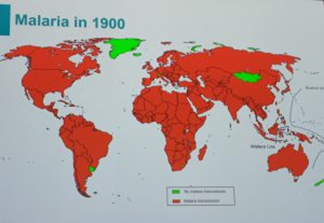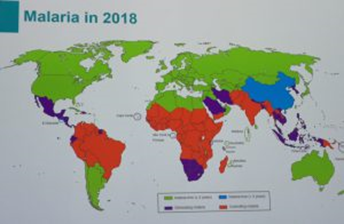Rotary Area of Focus: Fighting disease
Rotarians Against Malaria – an activity of Rotary Australia World Community Service (RAWCS)

 In the 1900s, malaria was pandemic in the world, bringing unimaginable burden of disease in all countries. However, due to a range of initiatives across the world, progress is being made to address this deadly disease.
In the 1900s, malaria was pandemic in the world, bringing unimaginable burden of disease in all countries. However, due to a range of initiatives across the world, progress is being made to address this deadly disease. Malaria was pandemic in the world in the 1900s (Malaria World Congress 2018) |
Fifteen years ago, malaria killed a child every 30 seconds. As a result of programs set up in response to the Millennium Development Goals, deaths have fallen by 60 percent. The aim of the ambitious Sustainable Development Goals is now to reduce malaria cases and deaths by a further 90 per cent by 2030.
Rotarians Against Malaria (RAM) is a volunteer-run organisation working to eliminate malaria. RAM was started in the early 1990s from a proposal by Dr Brian Handley of the Rotary Club of Chatswood (NSW) who was concerned about the surge in malaria incidence after the discontinuation of DDT-based malaria control programs. RAM was launched in 1995 in Tulagi, Solomon Islands by the Rotary Club of Honiara and Rotary District 9600. The primary focus of RAM has been the distribution of insecticide-treated nets to vulnerable populations.
In 1997 Ron Seddon and The Rotary Club of Port Moresby initiated the highly successful Adopt a Village program to encourage Australian Rotary Clubs to fund nets in PNG on a village-by-village basis. The Adopt A Village program was then successfully implemented in the Solomon Islands. In 1998 Rotary Australia World Community Service adopted RAM as an approved multi-district project. In 2005, RAM expanded its support to the National Malaria Control Program in Timor Leste.
There are now RAM committees in each of the 21 Rotary districts in Australia, which raise funds to support programs to control and eliminate malaria. RAM has raised more than $1.6 million to eliminate malaria since 2003. RAM works in conjunction with the Ministry of Health authorities in each country and complements the work of other malaria organisations, most notable the Global Fund to Fight AIDS, Tuberculosis and Malaria.
The good news is that there was a reduction in malaria cases with three (3) million cases less in 2018 than in 2017. The number of deaths has also reduced with an estimated 405,000 in 2018 and 416,000 in 2017. Ninety-four (94%) percent of deaths were in WHO African Region. Globally, the World Health Organisation (WHO) African Region had 93% of the total number of malaria cases. In contrast, the WHO South-East Asia Region contributed 3.4% to all malaria cases, and 2.1% from the WHO Eastern Mediterranean Region.

Malaria remained as one of the major causes of death in many developing countries (in red and purple) (Malaria World Congress, 2018) |
An important message is that globally, progress flatlined over the last four years between 2014 and 2018.
Rotary also partners with various other malaria elimination initiatives within the Rotary family and beyond.
One of these is the world’s first malaria vaccine which is being developed at Griffith University on the Gold Coast, supported by Rotary District 9640. https://malariavaccineproject.com/
For more information, visit:
Diane Wilkinson
Chair, International & Foundation Committee